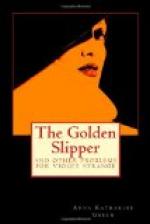“Let me speak for you,” hastily interposed his wife, springing to his side and clasping his arm with a fervour that was equally expressive of appeal and command. Then turning to me, she explained: “Since Mr. Hasbrouck’s unaccountable death, my husband has been labouring under an hallucination which I have only to mention, for you to recognize its perfect absurdity. He thinks— oh! do not look like that, Constant; you know it is an hallucination which must vanish the moment we drag it into broad daylight—that he—he, the best man in all the world, was himself the assailant of Mr. Hasbrouck.”
“Good God!”
“I say nothing of the impossibility of this being so,” she went on in a fever of expostulation. “He is blind, and could not have delivered such a shot even if he had desired to; besides, he had no weapon. But the inconsistency of the thing speaks for itself, and should assure him that his mind is unbalanced and that he is merely suffering from a shock that was greater than we realized. He is a physician and has had many such instances in his own practice. Why, he was very much attached to Mr. Hasbrouck! They were the best of friends, and though he insists that he killed him, he cannot give any reason for the deed.”
At these words the doctor’s face grew stern, and he spoke like an automaton repeating some fearful lesson:
“I killed him. I went to his room and deliberately shot him. I had nothing against him, and my remorse is extreme. Arrest me and let me pay the penalty of my crime. It is the only way in which I can obtain peace.”
Shocked beyond all power of self-control by this repetition of what she evidently considered the unhappy ravings of a madman, she let go his arm and turned upon me in frenzy.
“Convince him!” she cried. “Convince him by your questions that he never could have done this fearful thing.”
I was labouring under great excitement myself, for as a private agent with no official authority such as he evidently attributed to me in the blindness of his passion, I felt the incongruity of my position in the face of a matter of such tragic consequence. Besides, I agreed with her that he was in a distempered state of mind, and I hardly knew how to deal with one so fixed in his hallucination and with so much intelligence to support it. But the emergency was great, for he was holding out his wrists in the evident expectation of my taking him into instant custody; and the sight was killing his wife, who had sunk on the floor between us, in terror and anguish.
“You say you killed Mr. Hasbrouck,” I began. “Where did you get your pistol, and what did you do with it after you left his house?”
“My husband had no pistol; never had any pistol,” put in Mrs. Zabriskie, with vehement assertion. “If I had seen him with such a weapon—”
“I threw it away. When I left the house, I cast it as far from me as possible, for I was frightened at what I had done, horribly frightened.”




